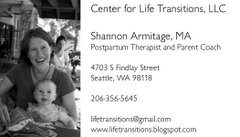Here's a little secret about therapy: One of the key factors to therapy's success has nothing to do with the skill or training of your therapist. One's own sense of hope and expectation for change can very well determine therapy's success. Now, any therapist worth her salt should be able to reflect hope and optimism in the face of difficult problems. The important thing to remember about hope is that it can be cultivated in any situation, as long as one chooses to believe.
While hope can help us weather trying situations, it also seems to inoculate against future difficulties. A new study done by researchers at the University of South Carolina suggests that women with strong religious or spiritual ties registered lower rates of postpartum depression than women without them. I'm going to make a leap here and propose that it's the hopefulness associated with a religious and/or spiritual orientation that prevented the seeds of postpartum depression from taking root. That's not to say that all hopeful women won't get PPMDs, or that only pessimists are struck with postpartum mood disorders. What I'm suggesting is that our "immunity" to depressive illnesses gets a boost from an active hopefulness practice. And while susceptibility to depressive illnesses isn't within one's control, cultivating one's own sense of hope and optimism is.
Finally, some hopeful news we can believe in!
Thursday, July 3, 2008
Subscribe to:
Post Comments (Atom)

No comments:
Post a Comment